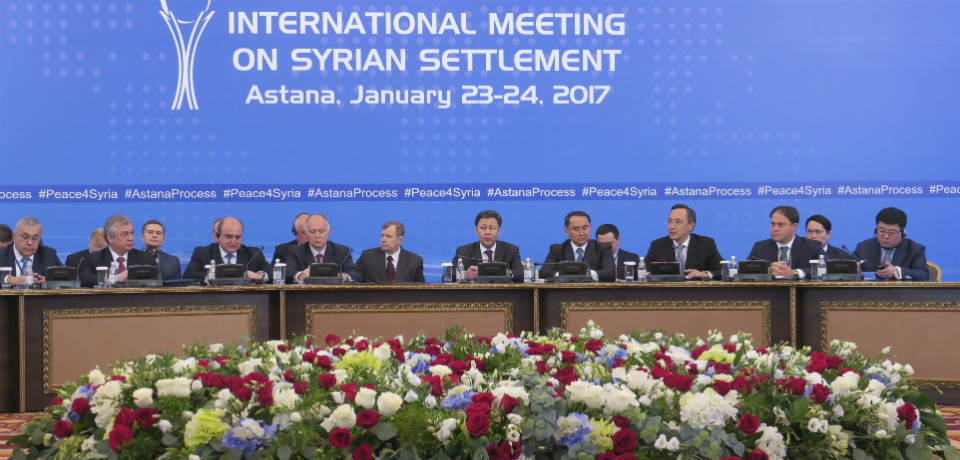Russian-sponsored Syria Peace Talks Stumble Out of the Gate
Robbie Gramer /Foreign Policy
23 يناير 2017

On Monday, Kremlin-sponsored peace talks meant to strengthen a fragile ceasefire between the Syrian government and rebels stumbled out of the gate in Astana, Kazakhstan. As a first test of Moscow’s ability to throw its diplomatic weight around in the region, it’s proving tough going for Russia.
First, the rebel delegation refused to talk face to face with Syrian President Bashar al-Assad’s negotiators. Then, Assad’s negotiator traded barbs with opposition negotiator Mohammed Alloush after he accused Assad of violating the truce. “We haven’t seen any signs of commitment to the ceasefire; there should be clarity and agreement on this first,” opposition spokesperson Yahya al-Aridi told Al Jazeera.
The head of Assad’s delegation, Bashar al-Jaafari, accused opposition negotiators of representing “terrorist organizations.” He also downplayed Turkey’s role in the talks because of its support for rebel groups in northern Syria. “Turkey is violating Syrian sovereignty, so there is no Syrian-Turkish dialogue,” he said.
Despite the diplomatic harangues, Russia pushed forward a new agreement with Iran and Turkey to jointly “fight against the IS and al-Nusra and their separation from the armed opposition groups,” according to a draft communique expected to be signed on Tuesday in Astana.
The draft communique also said Russia, Iran, and Turkey would back a separate round of U.N.-brokered peace talks between the Syrian government and rebel forces in Geneva on Feb. 8. The U.N. framed the talks in Astana as a “stepping stone” to the upcoming talks in Geneva, though Western leaders expressed concern Russia could be trying to supplant the Geneva talks to chart Syria’s future course on its own terms. The U.N. has repeatedly tried and failed to end the Syrian conflict, which has killed 300,000 and displaced 11 million since it began five years ago.
Russia, which backed Assad’s regime with a military operation starting in 2015, hoped the Astana talks could yield more progress than the usual U.N.-brokered talks because of three big changes in the Syria conflict.
First, Moscow forged a new and unlikely alliance with Turkey to fight ISIS — despite the fact that Turkey repeatedly called for Assad’s ouster and backs rebel forces. Second, new U.S. President Donald Trump indicated he would refocus U.S. efforts to work with Russia on fighting ISIS over removing Assad. (Though Trump did not send a representative to the talks in Astana; the U.S. ambassador to Kazakhstan is observing.) And third, Aleppo, Syria’s second largest city and the rebels’ main stronghold, fell to government forces in December — a signal the tide was turning in favor of Assad’s eventual victory.
“Everything has changed since Aleppo,” a Western diplomat told BBC. “There’s a new equation.”
But Russia may learn, if the first day of talks are any indication, that it’s an equation with no easy answers.
 عن أمل جنبلاط المتجدد: لبنان يستحق النضال
عن أمل جنبلاط المتجدد: لبنان يستحق النضال
 صحافيون أم عرّافون!
صحافيون أم عرّافون!
 ماذا يجري داخل أروقة بيت الكتائب المركزي؟
ماذا يجري داخل أروقة بيت الكتائب المركزي؟


 عن الخرائط التي تُرسم والإتفاقات التي تتساقط!
عن الخرائط التي تُرسم والإتفاقات التي تتساقط!
 “الإنحراف في الحياة”/ بقلم كمال جنبلاط
“الإنحراف في الحياة”/ بقلم كمال جنبلاط
 هاشتاغ #صار_الوقت يحل أولاً في حلقة جنبلاط
هاشتاغ #صار_الوقت يحل أولاً في حلقة جنبلاط
 طاولة نقاش عن أزمة الصحافة في جامعة AUST
طاولة نقاش عن أزمة الصحافة في جامعة AUST
 عبدالله: ليظهر لنا وزير مكافحة الفساد حرصه في صفقات البواخر والفيول
عبدالله: ليظهر لنا وزير مكافحة الفساد حرصه في صفقات البواخر والفيول
 عبدالله: غريب أمر وزارة مكافحة الفساد!
عبدالله: غريب أمر وزارة مكافحة الفساد!

 Comment to Uri Avnery: How Sad What Is Looming Ahead
Comment to Uri Avnery: How Sad What Is Looming Ahead
 “Not Enough!”
“Not Enough!”
 … لمن لم يقرأ يوسف البعيني/ بقلم وسام شيّا
… لمن لم يقرأ يوسف البعيني/ بقلم وسام شيّا
 كمال جنبلاط في مولده الأول بعد المائة: تعاليمه وأفكاره ما زالت الحلّ/بقلم عزيز المتني
كمال جنبلاط في مولده الأول بعد المائة: تعاليمه وأفكاره ما زالت الحلّ/بقلم عزيز المتني
 رئيس حزب/ وليس (… سابقاً)/ بقلم د. خليل احمد خليل
رئيس حزب/ وليس (… سابقاً)/ بقلم د. خليل احمد خليل
 التوازن السياسي في لبنان
التوازن السياسي في لبنان
 لبنان… مشاريع انقلابية مؤجلة
لبنان… مشاريع انقلابية مؤجلة
 جنبلاط وحَمَلة أختام الكاوتشوك
جنبلاط وحَمَلة أختام الكاوتشوك
 Le Liban est un symbole de tolérance
Le Liban est un symbole de tolérance
 Our Automated Future
Our Automated Future
 The True Origins of ISIS
The True Origins of ISIS
 Les Misérables vs. Macron
Les Misérables vs. Macron
 عذراً أيها المعلم/ بقلم مهج شعبان
عذراً أيها المعلم/ بقلم مهج شعبان
 رساله الى المعلم / بقلم ابو عاصم
رساله الى المعلم / بقلم ابو عاصم
 إلى روح القائد والمعلم كمال جنبلاط/ بقلم أنور الدبيسي
إلى روح القائد والمعلم كمال جنبلاط/ بقلم أنور الدبيسي
 أسرار وعناوين الصحف ليوم الجمعة 14 كانون الاول 2018
أسرار وعناوين الصحف ليوم الجمعة 14 كانون الاول 2018














